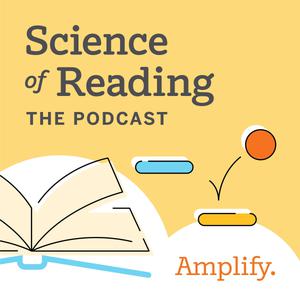
Science of Reading: The Podcast
Amplify Education
Science of Reading: The Podcast will deliver the latest insights from researchers and practitioners in early reading. Via a conversational approach, each episode explores a timely topic related to the science of reading.
- 39 minutes 13 secondsS9 E8: Cognitive science-informed teaching, with Natalie Wexler
In this episode, Susan Lambert rejoins podcast alum Natalie Wexler to discuss Natalie’s new book Beyond the Science of Reading: Connecting Literacy Instruction to the Science of Learning. Listeners will gain insights into why this topic is important, what this book offers educators, why Natalie was so drawn to writing this book, and what cognitive science-informed teaching looks like in general. Natalie addresses how cognitive load theory works in practice with literacy, misconceptions about focusing only on phonics, and scaling science-informed instruction. Natalie also answers a question from the listener mailbag about encouraging colleagues to adopt an evidence-based approach.
Show notes:- Connect with Natalie Wexler:
- Website: nataliewexler.com
- Pre-order Beyond the Science of Reading: Connecting Literacy Instruction to the Science of Learning: https://ascd.org/books/beyond-the-science-of-reading?variant=125006
- Substack: Minding the Gap, by Natalie Wexler
- Resources:
- Join our community Facebook Group: www.facebook.com/groups/scienceofreading
- Connect with Susan Lambert: www.linkedin.com/in/susan-lambert-b1512761/
- Listen to Illinois administrator Serena Klosa on Beyond My Years!
Quotes:
“We’re overlooking the ways in which the typical approach to teaching reading comprehension and writing actually conflict with what cognitive science tells us about how people learn to do those things.” —Natalie Wexler“We spend much more time trying to teach…them to read, but we kind of expect them to just pick up writing. You know, for most kids, it does not happen.” —Natalie Wexler
“No matter how good you are at making inferences, if you don't have the requisite background knowledge, you're not gonna be able to do it.” —Natalie Wexler
“It doesn't work to just ask inexperienced writers to just write down stuff. That is not going to provide the cognitive benefits.” —Natalie Wexler
Episode timestamps*
02:00 Introduction: Who is Natalie Wexler?
04:00 Natalie’s new book
07:00 What is the science of learning?
11:00 Connecting the science of learning to reading, writing, literacy
14:00 Automaticity and cognitive load theory
17:00 Transferable vs non-transferable skills
22:00 Strategies to release cognitive load when learning new skills
24:00 Learning to write, writing to learn.
29:00 Bringing science informed teaching to scale
32:00 What readers will take away from the book
33:00 Mailbag question: How can one person get more colleagues to use an evidence-based approach?
36:00 Final thoughts
*Timestamps are approximate15 January 2025, 7:00 am - Connect with Natalie Wexler:
- 25 minutes 22 secondsSpecial Episode: Award-winning ways to put science into practice
Amplify’s 2024 Science of Reading Star Award winners share insights from their daily work. They reflect on why it’s so critical to stay grounded in evidence-based literacy practices and how they bring those practices into their schools and classrooms. Listeners will be inspired by the creative ideas of educators who are making a difference in the lives of students across the country. Winners honored in the episode in order of appearance are: Amber Hines, Vance County Schools, NC; Elizabeth Caton, Windber Area Elementary School, PA; Jamie Vannoy, Wirt County Primary Center, WV; Christine Michalik, Cicero School District 99, IL; Andrea Mason, County Line Elementary School, GA; A. Simone McQuaige, Prince George’s County Public Schools, MD.
Show notes:- Apply for the 2025 Amplify Science of Reading Star Awards
- Learn more about our 2024 Star Award winners
- Subscribe to Beyond My Years
Quotes:
“There is no, ‘Let's try this. Let's try that.’ When it's evidence based, you know that it's proven to be effective.” —Amber Hines“It's important that we are aligning our practices to standards and what the students are required to do—but also what they need.” —Elizabeth Caton
“If we don't make a conscious effort to utilize evidence-based practices, we are going to be failing our most at-risk populations.” —Jamie Vannoy
“All students should have the opportunity for multiple readings of the same text to build comprehension, to build fluency.” —Christine Michalik
“It's really important to utilize assessments, [to] make sure that my students are getting exactly what they need based on the data that I get from assessments, but also based on the data that I get from regular progress monitoring.” —Andrea Mason
“This is not something that can be just done at the schoolhouse. It involves the community and all of our community stakeholders.” —A. Simone McQuaige
1 January 2025, 8:00 am - 51 minutes 7 secondsSpecial: Lessons from the 2024 National Teacher of the Year, with Missy Testerman
This week, we’re highlighting an episode of Beyond My Years, our sibling podcast that gives you exclusive access to all the wisdom of veteran educators. Beyond My Years host, Ana Torres, learns from the best as she sits down with 2024 National Teacher of the Year Missy Testerman. Missy teaches Ana about being open to new ideas and perspectives, offers tips on building relationships with families, and discusses the importance of slowing down. Missy doesn’t shy away from tough topics, like managing the “who knows best” struggles among administrators, teachers, and parents, and knowing when it’s time to step away from teaching, In addition, Classroom Insider Eric Cross and Ana discuss understanding your community, being more flexible in presenting your lessons, and seeking mentorship and continuous growth.
Show notes:- Connect with Missy Testerman
- Instagram: @missytesterman2024ntoy
- LinkedIn: @missy-testerman
- X: @missytesterman
- Subscribe to Beyond My Years https://amplify.com/beyond-my-years
- Follow us on Instagram @amplify.education
- Connect with Eric Cross: https://www.ericcross.org/
- Connect with Ana Torres: https://www.linkedin.com/in/anayansi-ana-torres-m-ed-26a10654/
Quotes:
“Find a mentor. Someone you trust. Listen to that person, watch that person, ask that person questions. You know, you don't have to figure this out on your own. People want to help you and you have to take that help. It's not a sign of weakness. It's a sign that you want to be better.” —Missy Testerman“I want them to be proud of where they came from, always, because that's part of their story. It's always going to be an important part of their story.” —Missy Testerman
“I have no magic answers. I have some experiences and I have a little bit of wisdom from three decades of time spent in the education field, but I absolutely do not have it all figured out.” —Missy Testerman
“The reality is that the journey toward wisdom in any career, especially in education, has to be slow and steady.” —Missy Testerman
11 December 2024, 7:00 am - Connect with Missy Testerman
- 43 minutes 47 secondsS9 E7: Neurodiversity and the reading brain, with Ioulia Kovelman, Ph.D.
Susan is joined by Ioulia Kovelman, Ph.D., professor in the Department of Psychology at the University of Michigan, to give educators the perspective of a developmental cognitive neuroscientist on literacy development. Starting with the basics of cognitive science versus brain science, Ioulia gives a comprehensive overview into how the brain changes as children learn to read, including differences seen in neurodiverse students and multilingual/English learners. Ioulia then answers a question from our listener mailbag on neuroscience and dyslexia and how current research can inform teaching strategies. Ioulia ends with a rallying message that scientists, teachers, and children cannot stand alone and need to find ways to connect with each other to strengthen literacy as a whole.
Show notes:- Submit your literacy questions for a chance to win!
- Website: Language & Literacy Lab
- Video: Language & Literacy Project at the University of Michigan
- Listen: Our mini-series exploring how the Science of Reading serves MLs/ELs
Quotes:
“We are different learners. And these are really different learners. And by giving them literacy instruction, targeted literacy instruction, we are changing their brains. But that doesn't mean we're making them the same.” —Ioulia Kovelman, Ph.D.
“We talked about languages being different. They're exercising slightly different muscles of your language system.” —Ioulia Kovelman, Ph.D.“Science is informed by teachers and children. We're all together. I do not teach children. Teachers don't usually do science. But we have to find ways of connecting with each other.” —Ioulia Kovelman, Ph.D.
Episode timestamps*
02:00 Introduction: Who is Ioulia?
06:00 Cognitive science vs brain science
08:00 How the brain changes as children learn to read
11:00 Following brain development for children that struggle with language development
14:00 Physical differences in brain development between the average brain and a neurodiverse brain
17:00 Mailbag question: Neuroscience and dyslexia
20:00 How neuroscience informs teaching strategies for children with dyslexia
25:00 Monolingual vs multilingual brains
33:00 Language literacy lab
38:00 Connecting research to classroom instruction
41:00 Final thoughts
*Timestamps are approximate, rounded to nearest minute27 November 2024, 7:00 am - 36 minutes 8 secondsS9 E6: Making high-quality text free and accessible, with Susanne Nobles
In this episode, Susan Lambert chats with ReadWorks Chief Academic Officer Susanne Nobles, Ph.D., to explore the organization's mission of making high-quality texts free and accessible to all. Together, they discuss ReadWorks’ Article-A-Day program, which offers articles to build students' knowledge and vocabulary while supporting teachers with resources that promote topical coherence. Susanne shares insights into why text quality matters, including that kids know when text isn’t worth their time and attention. She also details how ReadWorks ensures the quality of their materials, describes the Spanish-English texts they’ve introduced to support multilingual/English learners, and offers advice for listeners thinking about text quality and cohesion.
Show notes:- LinkedIn: https://www.linkedin.com/in/susannenobles/.
- ReadWorks Instagram: https://www.instagram.com/readworks/?hl=en
Quotes:
“I have a fear that too much decoding practice can become ‘Why am I reading?’ We lose the ultimate point of why all of us read, which is to learn and to gain meaning.” —Susanne Nobles“Kids know when a text is worth their time.” —Susanne Nobles
“We want to put a great book in a kid's hands and have them get excited about reading and therefore get good at reading. And it really goes the other way. And so it's once you build that ability to read, then that excitement comes with reading.” —Susanne Nobles
Episode timestamps
02:00 Introduction: Who is Susanne Nobles?
04:00 Overview of ReadWorks
10:00 Article-A-Day Program
12:00 Importance of Topical Coherence
13:00 Why knowledge is important to reading
16:00 Introduction to Decodables
19:00 Text Quality and Evaluation
24:00 Supporting Multilingual Learners
29:00 Audio and Accessibility
33:00 Final Thoughts and Conclusion
*Timestamps are approximate, rounded to nearest minute13 November 2024, 7:00 am - 36 minutes 23 secondsS9 E5: What makes a literate brain, with Lori Josephson
On this episode of the podcast, Lori Josephson joins Susan to talk about her new book Calling All Neurons! How Reading and Spelling Happen. Lori discusses her journey into literacy and how she saw the need for an accessible, digestible book about the brain science behind learning to read — one that would be enjoyable for adults and students alike. Lori explains what a neuron is and shows how understanding neural networks is essential to understanding learning to read. She also delves into the importance of getting everyone in a student’s life involved in their literacy development. Lori and Susan also answer some listener-submitted questions, prompting discussions on how to help older elementary students who lack foundational skills and advice for educators who work with students with significant cognitive disabilities.
Show notes:- Submit your literacy questions for a chance to win!
- Book: Calling All Neurons! How Reading and Spelling Happen
- Connect with Lori:
- Website: lorijosephson.com
- LinkedIn: https://www.linkedin.com/in/lori-josephson/
- X: @lorijosephson2
- Facebook: Lori Josephson
- Instagram: @calling_all_neurons
- Read: Towards a dynamic, comprehensive conceptualization of dyslexia
- Dr. Nancy Young's Ladder of Reading
- Watch: Lori Josephson on the Facebook group Science of Reading—What I Should Have Learned in College
Quotes:
“I firmly believe that no matter how old you are, you still need to learn the same information.” —Lori Josephson“In my mind, I use this equation. Knowledge equals motivation, equals active learning, equals resilience, equals success.” —Lori Josephson
“Creating a literate brain is a team sport. Everyone needs to be involved. The parents, caregivers, teachers—they need to be engaged in an interactive way.” —Lori Josephson
“Literacy is a civil right. It's also a gift. It's an opportunity to share thoughts, feelings with others that can be revisited and saved.” —Lori Josephson
Timestamps
02:00 Introduction: Lori Josephson and her Journey into Literacy
05:00 The Motivation Behind 'Calling All Neurons'
08:00 Understanding Neurons and Neural Networks
15:00 The Reciprocal Process of Reading and Spelling
20:00 The Influence of the Cerebellum in Reading
21:00 Unique Aspects of the Book
25:00 Addressing Foundational Skills in Older Students
30:00 Supporting Students with Cognitive Disabilities
31:00 The Importance of Literacy and Empathy
33:00 Final Thoughts
*Timestamps are approximate, rounded to nearest minute30 October 2024, 6:00 am - 52 minutes 31 secondsS9 E4: Comprehension is not a skill, with Hugh Catts, Ph.D.
In this episode Susan Lambert is joined by Hugh Catts, Ph.D., professor at Florida State University, to break down what comprehension is and bust some myths around what it isn’t. With a family history of dyslexia, he has a personal connection to the topic that led him into research in language sciences and language disorders. He discusses how his findings moved him away from viewing comprehension as simply a “component of reading” but rather something entirely separate—a condition created over time, defined by purpose, and influenced by prior knowledge. Together, Susan and Hugh address many comprehension-related contexts, such as the simple view of reading, the five pillars of reading, and comprehension’s relationship to knowledge building. Hugh also gives listeners practical advice for helping students suss out their comprehension before reading, and he clarifies why understanding the standard of coherence is important.
Show notes:- Submit your literacy questions for a chance to win!
- Read: Rethinking How to Promote Reading Comprehension by Hugh Catts
- Read: The Simple View of Reading: Advancements and False Impressions by Hugh Catts
- Follow Hugh on X: @CattsHugh
Quotes:
“If I was going to define comprehension, it's not a single thing. I mean, that's the problem. We want it to be a single thing, but it depends upon what you're reading and why you're reading it.” –Hugh Catts, Ph.D.
“What comprehension is is the interaction of what you bring into that reading situation and what you already know about it and your motivation and purpose to comprehend it.” –Hugh Catts, Ph.D.“There's just not enough mental reserve to be able to build that meaning that quickly. So it helps tremendously that you have some knowledge about it beforehand. That knowledge gives you a place to put information. So when you read about something, it gives you storage for the information. It's kind of like a cubby hole that you put the mail in, in an office.” ––Hugh Catts, Ph.D.
Episode timestamps*
02:00 Introduction: Who is Hugh Catts?
03:00 Personal Connection to Dyslexia
07:00 Rethinking comprehension as a component of reading
11:00 Vocabulary and comprehension
15:00 Comprehension as a condition you create
16:00 Language comprehension and the simple view of reading
19:00 Differences in types of comprehension
26:00 What comprehension is and isn’t
32:00 Thinking deeply
39:00 Background knowledge and comprehension
42:00 Automatic inferencing
50:00 Final thoughts
*Timestamps are approximate, rounded to nearest minute16 October 2024, 6:00 am - 43 minutes 13 secondsS9 E3: Know the non-negotiables in a program aligned to the Science of Reading, with Kari Kurto
On this episode, Kari Kurto, National Science of Reading Project Director at The Reading League, discusses The Reading League’s curriculum evaluation tool, which assesses a curriculum’s research-based practices. Kurto's conversation with Susan Lambert touches on her background teaching students with dyslexia, the non-negotiables in curriculum aligned to the Science of Reading, and how educators can use information about an evaluated curriculum to inform instruction. While Kurto stresses that no program is perfect, she and her colleagues have worked to equip educators with a tool to more easily and objectively access information when making curriculum choices..
Show notes:- Submit your Science of Reading questions for a chance to win!
- Submit your literacy questions for a chance to win!
- eBook: Science of Reading: Defining Guide from The Reading League
- The Reading League’s Curriculum Evaluation Guidelines
- Reading League Compass
- Subscribe to The Reading League’s newsletter
Quotes:
“Just because we have this report and we say, ‘All right, this curriculum has all the stuff,’ if you don't teach it, then you're a red flag of your own.” —Kari Kurto
“It's a movement of improvement, right? We're constantly striving to improve. And don't give up. Share your stories; share your success stories.” —Kari Kurto“Thank you to those folks who have been listening. Thank you to the folks who are curious about learning more, those who have spent years implementing and tweaking and improving literacy outcomes for our country's next generation. I mean, that's huge.” —Kari Kurto
Episode timestamps*
02:00 Introduction: Who is Kari Kurto?
08:00 Teaching kids with dyslexia, what they need to learn to read
10:00 Reading league defining guide
11:00 Curriculum review tool
16:00 Determining which programs to review
20:00 Using the curriculum review tool as professional development
21:00 Non-negotiables in a science of reading curriculum
24:00 How to use the information from a program evaluation
30:00 Long-term plans of the navigation report tool
32:00 The reporting team
34:00 The Reading League compass
37:00 The Reading League journal
40:00 Final Advice
*Timestamps are approximate, rounded to nearest minute2 October 2024, 6:00 am - 54 minutes 54 secondsS9 E2: Standards are the 'what' and curriculum is the 'how,' with Sue Pimentel
In this episode, Susan Lambert welcomes back Sue Pimentel to discuss the history and impact of the Common Core State Standards on English Language Arts and Literacy (ELA) education in the United States. Susan and Sue revisit what the standards were designed to focus on: knowledge building, college and career readiness, and fluency in both literary and informational texts. Their conversation covers the importance of text complexity, the lack of a research base to support leveled readers, and knowledge building as a matter of equity and content as a matter of access. While acknowledging the value of these standards, the discussion also highlights their limitations. Sue underscores the importance of always returning to the research to ensure students are truly learning, preparing them to navigate the world and ultimately, live happier lives.
Show notes:- Website: Knowledge Matters Review Tool
- Listen: Season 4, Episode 5: Reading as liberation with Sue Pimentel
- Read: “Standards Are Not Curriculum”
- Website: Knowledge Matters Campaign
Quotes:
“Vocabulary is how we describe concepts; it's how we know how to talk to one another.” —Sue Pimentel“What the standards say is, ‘Leveled texts are out and complex texts are in.’ There's no research behind assigning a level to students reading and then sort of imprisoning them in that.” —Sue Pimentel
“The more stuff you know, the better you're able to navigate the world….and I think the happier life is. And certainly the happier kids' lives are when they're actually learning stuff.” —Sue Pimentel
Episode timestamps*
02:00 Looking Back at the Common Core State Standards for ELA
04:00 Knowledge Building and Text Evidence
08:00 Text Complexity and College Readiness
14:00 Standards Organization
23:00 Collaborative Effort in Standards Development
26:00 Integrating Standards into Instruction
26:00 The Importance of Contextual Learning
27:00 Challenges with Early Curriculum Implementation
31:00 Standards vs. Curriculum
35:00 The Role of Knowledge Building in Literacy
50:00 Final Thoughts and Advice
*Timestamps are approximate, rounded to nearest minute18 September 2024, 6:00 am - 41 minutes 7 secondsS9 E1: Literacy as a catalyst for change, with Ray James
In the Season 9 premiere of Science of Reading: The Podcast, Susan Lambert speaks with Ray James, Head of School at The Ansley School, about the transformative impact of literacy instruction. The Ansley School, which serves children experiencing homelessness, has made evidence-based literacy instruction a key piece of its efforts to foster profound educational and community change. Ray shares his journey and explores how a focus on literacy provides benefits that extend beyond the classroom to the broader community. This episode underscores the importance of foundational literacy skills and sets the stage for a new season dedicated to a literacy reboot.
Show notes:- Submit your literacy questions for a chance to win!
- The Ansley School Instagram): @theansleyschool
- Ray’s Instagram: @the_rayvolution
- Website: https://theansleyschool.org/
Quotes:
"If you don't get reading right in an elementary school, every piece of the school suffers." —Ray James
"We’re not just doing school, but educating people. I think a lot of people do school, we’re trying to educate our community holistically."—Ray James"Education isn't just about academics, it's about creating a safe place and providing holistic, evidence-based literacy instruction that catalyzes real change."—Ray James
Episode timestamps*
01:00 Season nine: Reading reboot
02:00 Introduction: Who is Ray James?
04:00 Ray James' journey from politics to education
06:00 The Boyce L. Ansley School community
10:00 Support structures for families
13:00 Transforming literacy at The Ansley School
20:00 Impact of literacy initiatives
29:00 Future goals and vision for The Ansley School
40:00 Season nine: Looking ahead
*Timestamps are approximate, rounded to nearest minute4 September 2024, 6:00 am - 50 minutes 51 secondsSummer '24 Interlude E3: Training teachers well from the start, with Lisa Lenhart and Rebecca Tolson
In this Science of Reading: The Podcast episode, Susan Lambert speaks with Rebecca Tolson and Lisa Lenhart about their roles at the University of Akron's newly established Center for Structured Literacy. They discuss their personal journeys in literacy education, the large grant received from the Ohio Department of Higher Education, and how the Center aims to prepare pre-service teachers using the Science of Reading and structured literacy. Rebecca and Lisa elaborate on the faculty’s training program, curriculum updates, and the potential community impact. The conversation also touches on the emotional and professional challenges in shifting to evidence-based practices, the history of literacy legislation in Ohio, and the Center's long-term goals—including IDA accreditation and expanding their impact on both pre-service and in-service educators.
Show Notes- The Reading League: What is the Science of Reading?
- E-books from the Center for Dyslexia at Middle Tennessee State University
- Ohio’s Dyslexia Guidebook
- Read Ohio Website
- International Dyslexia Foundation: Knowledge and Practice Standards for Teachers of Reading
Quotes
“We're also making sure that our students are prepared in structured literacy, not just to one program, so they're able to understand the structure and adopt it to any program any district is using.” —Lisa Lenhart“The Center for Structured Literacy is about empowering teachers at the onset—bachelor's degree. If districts have to retrain them after they graduate, then we're not doing something right.” —Rebecca Tolson
‘The more I learn, the better I'm at my craft and my teaching for my students.” —Rebecca Tolson
“It takes the right person leading you and it takes hard conversations of what we believe.” —Lisa Lenhart
Timestamps*
02:00 Introduction: Who is Rebecca Tolson?
04:00 Introduction: Who is Lisa Lenhart?
05:00 Overview: University of Akron Center for Structured Literacy
11:00 Overhauling an undergraduate program
15:00 Origin Story: Center for Structured Literacy
20:00 A Passion for the Science of Reading
23:00 Intersecting goals: Center for Structured Literacy and the state of Ohio
27:00 The importance of training teachers well the first time
33:00 Training teachers to encounter schools with a variety of approaches to literacy
36:00 Long-term goals for the center
39:00 How to get more educators prepared to teach with evidence-based practices
41:00 The importance of having hard conversations*Timestamps are approximate, rounded to nearest minute
21 August 2024, 6:00 am - More Episodes? Get the App
- https://www.amplify.com/
- en-us
Your feedback is valuable to us. Should you encounter any bugs, glitches, lack of functionality or other problems, please email us on [email protected] or join Moon.FM Telegram Group where you can talk directly to the dev team who are happy to answer any queries.
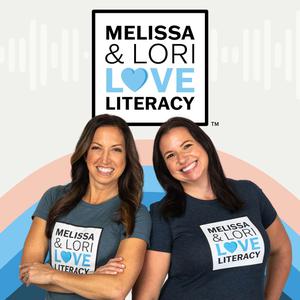 Melissa & Lori Love Literacy ™
Melissa & Lori Love Literacy ™
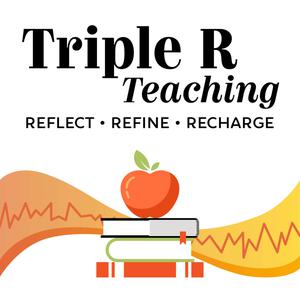 Triple R Teaching
Triple R Teaching
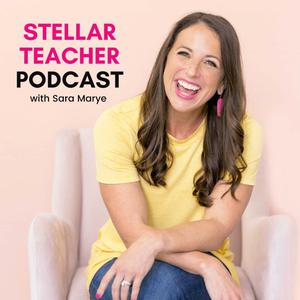 Stellar Teacher Podcast
Stellar Teacher Podcast
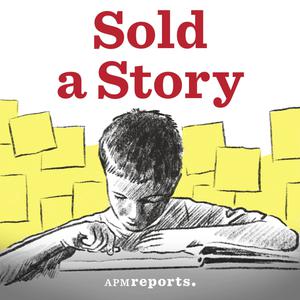 Sold a Story
Sold a Story
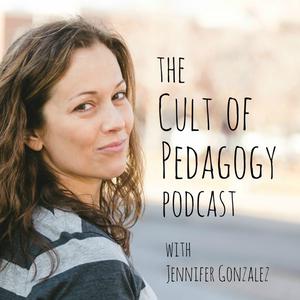 The Cult of Pedagogy Podcast
The Cult of Pedagogy Podcast